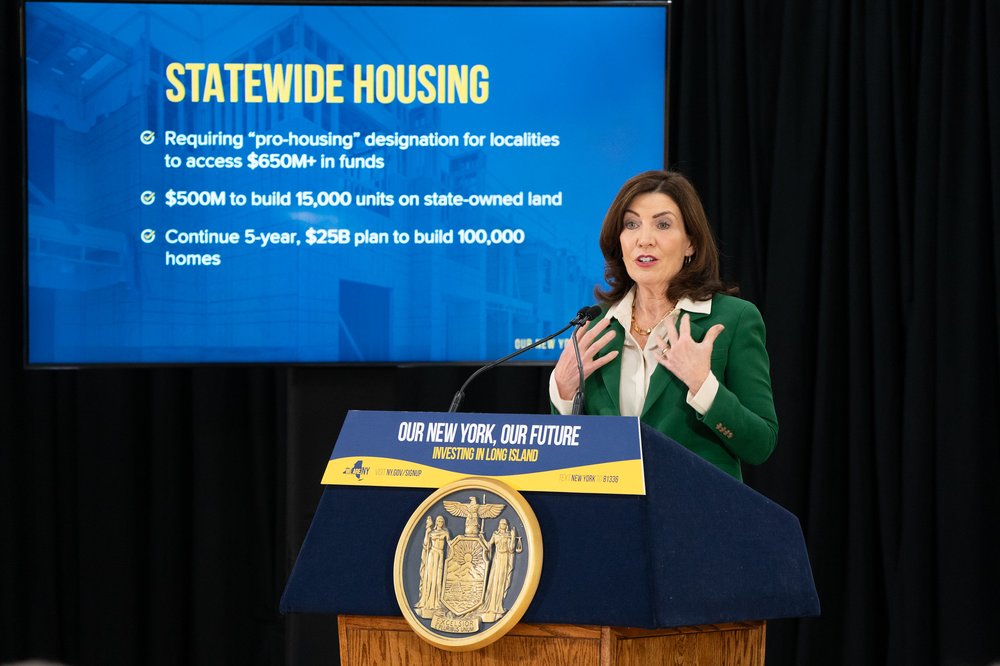Gov. Hochul's budget bans insurance discrimination against low-income tenants
Jan. 19, 2024, 11:35 a.m.
The governor’s executive budget includes rules prohibiting insurers from refusing to cover buildings based on tenants’ level and source of income.

Gov. Kathy Hochul is proposing new rules to prohibit insurers from discriminating against low-income tenants, following a Gothamist investigation into the pervasive practice contributing to surging housing costs.
Hochul’s executive budget, which was released this week, includes a measure prohibiting insurance companies from refusing to cover buildings based on the tenants’ source of income. The plan would also prohibit insurers from asking property owners how much tenants earn and whether their buildings contain income-restricted apartments where low- and middle-income tenants pay affordable rents.
“A fairer insurance market will help reduce costs for tenants and property owners and allow even more affordable housing to be built and preserved,” said Hochul’s spokesperson, Justin Henry, in a statement.
The proposal, contained in her $233 billion budget plan, comes seven months after Gothamist found that dozens of insurance companies doing business in New York ask building owners if they rent to tenants with housing subsidies, like the federal Section 8 program, and refuse to cover their buildings.
The rejections force owners to find insurance coverage — which is mandatory — through unregulated markets, usually at far higher costs. Landlords often pass on the cost increases to tenants through higher rents. But in the case of rent-stabilized apartments, landlords may cover the higher insurance premium by forgoing routine maintenance or other building investments.
A 2022 report by New York’s Department of Financial Services and Division of Homes and Community Renewal found that insurance premiums rose by an average of 43% for affordable housing owners between 2019 and 2021. The report attributed the spike to a range of factors, including climate catastrophes and regulations unique to New York, as well as routine rejections based on tenant characteristics.
Property owners, industry experts and state lawmakers have referred to the practice as insurance “redlining.” State and city laws already prohibit housing discrimination based on source of income, like Section 8 or the local CityFHEPS housing voucher program, which pay the bulk of the rent for tenants. In New York, a disproportionate number of renters with housing vouchers are people of color, women and renters with disabilities — protected classes under federal fair housing law.
“Some people would say that’s insidious and that’s a form of redlining,” said insurance attorney Elliott Kroll, who has represented major insurers.
Assemblymember Linda Rosenthal, who chairs the chamber's housing committee, introduced two pieces of legislation to ban source of income discrimination by insurers immediately after Gothamist’s investigation and said she welcomed the governor’s support.
“I’m glad to hear that she stands behind all of our efforts to not allow the insurance companies to refuse buildings where people have Section 8,” Rosenthal said. “It’s unacceptable.”
State Sen. Jamaal Bailey is also sponsoring legislation to prevent insurers from discriminating based on tenant characteristics, including source of income, and said the issue can unite landlords and renters who are eager to drive down costs.
“If you’re really drilling down on things that increase rents, it’s insurance premiums,” he said.
Last year, 682 property and liability insurance carriers certified in New York provided coverage in the state, according to the Department of Financial Services. But very few of them insure buildings with low-income tenants or tenants using housing vouchers, said Susan Camerata, the chief financial officer of Wavecrest, during a panel discussion last July.
Camerata, whose company manages or owns more than 30,000 regulated and income-restricted apartments, said the proposed ban is “a step in the right direction for changing the insurance industry and how they write policies."
“Basing policies or declinations on the income of people who live in buildings should never be used to assess a policy,” Camerata said.
New York lawmakers vow insurance industry crackdown after Gothamist investigation Insurance companies routinely deny NYC buildings with subsidized tenants Gov. Hochul unveils 2024 budget with $2.4B for migrant spending